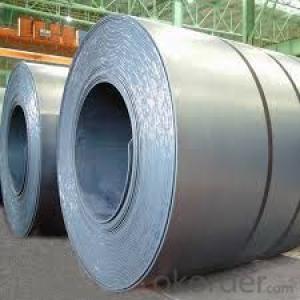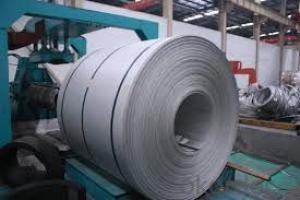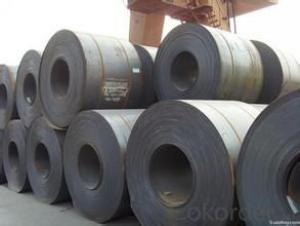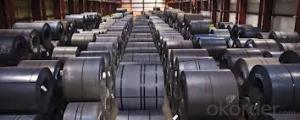Hot Rolled Steel Sheet in Coil CS TYPE A,B,C from China
- Loading Port:
- Tianjin
- Payment Terms:
- TT OR LC
- Min Order Qty:
- 100 m.t.
- Supply Capability:
- 500000 m.t./month
OKorder Service Pledge
OKorder Financial Service
You Might Also Like
Product Description:
Product: | Hot Rolled Steel Coils/Sheets |
Material: | Q195,Q235,A36,SS400,S235JR,Q345,ST37-2, CCSB etc |
Standard : | JIS G3002 GB/T251B |
Technique: | hot rolled |
Thickness | 1.2mm to 200mm |
Tolerance of thickness: | :+/-0.03mm |
Width: | 750mm-2000mm |
Tolerance of width: | :+/-5.00mm (aiming to +/-2.00mm) |
Normal width: | 914mm, 1000mm, 1200mm, 1219mm, 1250mm,1500mm |
Length: | According to requirement |
Coil ID: | 508mm-610mm |
Coil Weight: | 10-25 Metric Tons |
Surface: | Black, Chromate, fingerprint resistant treatment, slight oiled or non-oiled, dry |
Port of Loading: | Tianjin/Shanghai port |
Packaging Details: | Standard export packing or according to the clients required |
Delivery Time | Within 30 days after received 30% deposit or workable L/C |
Payment Terms: | L/C,T/T |
We can ensure that stable quality standards are maintained, strictly meeting both market requirements and customers’ expectations. Our products enjoy an excellent reputation and have been exported to Europe, South-America, the Middle-East, Southeast-Asia, Africa and Russia etc.. We sincerely hope to establish good and long-term business relationship with your esteemed company.
Images of hold rolled steel coil:
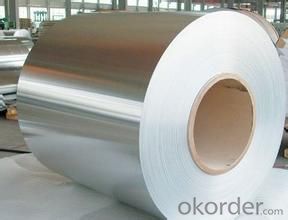
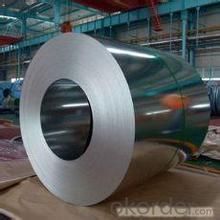
- Q:What are the common applications of stainless steel coils?
- Stainless steel coils have a wide range of applications due to their unique properties and characteristics. Some of the most common applications of stainless steel coils include: 1. Automotive industry: Stainless steel coils are widely used in the automotive industry for various components such as exhaust systems, mufflers, and catalytic converters. The corrosion resistance and durability of stainless steel make it an ideal choice for these applications. 2. Construction industry: Stainless steel coils are extensively used in the construction industry for structural elements, roofing, cladding, and facades. Its high strength, resistance to corrosion, and aesthetic appeal make stainless steel a popular choice for architectural projects. 3. Kitchen appliances: Stainless steel coils are commonly used in the manufacturing of kitchen appliances such as refrigerators, stoves, ovens, and dishwashers. The easy cleanability, resistance to heat and stains, and hygienic properties of stainless steel make it a preferred material for these applications. 4. Food processing industry: Stainless steel coils are widely used in the food processing industry for equipment such as tanks, pipes, and conveyor systems. The corrosion resistance and easy cleanability of stainless steel ensure the integrity and hygiene of food products. 5. Medical industry: Stainless steel coils find extensive use in the medical industry for various applications such as medical devices, surgical instruments, and implants. The biocompatibility, strength, and resistance to corrosion make stainless steel an ideal material for these critical healthcare applications. 6. Energy sector: Stainless steel coils are used in the energy sector for applications such as heat exchangers, boilers, and pipelines. The high-temperature resistance, excellent mechanical properties, and corrosion resistance of stainless steel make it suitable for these demanding applications. 7. Chemical industry: Stainless steel coils are employed in the chemical industry for storage tanks, piping systems, and reactors. The corrosion resistance and ability to withstand high temperatures and aggressive chemicals make stainless steel coils a reliable choice for handling various chemical substances. 8. Manufacturing industry: Stainless steel coils are used in a wide range of manufacturing processes such as stamping, forming, and fabrication. The versatility, durability, and ease of machining of stainless steel make it a popular choice for various industrial applications. Overall, the common applications of stainless steel coils are vast and varied, thanks to their exceptional properties like corrosion resistance, strength, durability, and aesthetic appeal.
- Q:How are steel coils measured?
- Steel coils are measured by their weight and dimensions. The weight of the coil is measured using weighing scales, while the dimensions are typically measured using calipers or tape measures. The length, width, and thickness of the coil are important measurements that determine its size and suitability for specific applications.
- Q:How are steel coils used in the production of power generation equipment?
- Steel coils are used in the production of power generation equipment as they are shaped and formed into various components such as turbine casings, generator frames, and steam pipes. These coils provide the necessary strength and durability to withstand the high temperatures, pressure, and mechanical stresses involved in power generation processes. Additionally, steel coils are often coated with protective layers to prevent corrosion, ensuring the longevity and reliability of the equipment.
- Q:Classify the following in as many ways as possible:stainless steelpureheterogeneous mixturehomogeneous mixturenone of these
- Stainless steel is an iron-carbon alloy that contains about 13% chromium. There are 3 types, each of which have different properties depending on what ingredient is added and these are...nickel, carbon, and manganese... Stainless steal is homogeneous in that you only see one phase (steel) and none of the different parts from which it is made...
- Q:The highest quality i have seen is 9260 and i want to know if there is a higher quality steel.
- Types of steel are one issue. But the quality of steel no matter what type is even more important. The only way to be sure that you are getting a good blade is to buy from someone that already has a reputation for producing great blades. Stop the questions about who thinks what type of steel is best and investigate the steel blades offered by companies like Bugei Trading company. they have good blades. Opinions vary, but Bugei has proven that they make good swords. That is all that is needed to be known. Any questions you have are best directed to them, not here.
- Q:nylon sounds alot better but i want to keep the acoustic i have now. Is it proper to put nylon on an acoustic guitar meant for steel strings?
- This Site Might Help You. RE: can you put nylon strings on a steel string acoustic guitar? nylon sounds alot better but i want to keep the acoustic i have now. Is it proper to put nylon on an acoustic guitar meant for steel strings?
- Q:How are steel coils inspected for yield strength using tensile testing?
- Tensile testing is the method used to inspect the yield strength of steel coils. This involves subjecting a sample of the coil to controlled tension until it reaches its breaking point. Through this test, various mechanical properties of the steel, including yield strength, can be determined. To conduct the tensile testing for yield strength inspection, a small strip of the coil is cut and prepared. The strip is then placed in a machine specifically designed for tensile testing. This machine consists of two grips that securely hold the strip at opposite ends. Subsequently, the machine applies a steadily increasing force to the strip, causing it to elongate until it eventually breaks. Throughout the test, the machine measures the force applied and the elongation of the strip. The yield strength is determined by identifying the point on the stress-strain curve where the material begins to undergo plastic deformation, meaning it exhibits permanent deformation without any increase in load. Typically, the yield strength is reported as the stress required to cause a specific amount of plastic deformation, such as 0.2% or 0.5%. This value represents the maximum stress that the steel can endure without experiencing permanent deformation. By performing tensile testing on a sample of the steel coil, it becomes possible to ascertain its yield strength. This information is vital in ensuring the quality and dependability of the steel coil, as it indicates the maximum stress it can tolerate before permanent deformation occurs. Furthermore, this testing method allows for the comprehensive evaluation of other mechanical properties, including ultimate tensile strength, elongation, and modulus of elasticity, thus providing a thorough understanding of the steel's performance characteristics.
- Q:What are the dimensions of steel coils used in the transportation equipment industry?
- The dimensions of steel coils used in the transportation equipment industry can vary depending on the specific application and manufacturer. However, commonly used dimensions range from 0.015 inches to 0.625 inches in thickness and from 24 inches to 60 inches in width. The outer diameter of these coils typically falls within the range of 48 inches to 72 inches.
- Q:How are steel coils coated to prevent corrosion?
- Steel coils are coated to prevent corrosion through a process called galvanization. In this process, the steel coils are submerged in a bath of molten zinc, creating a protective zinc coating on the surface. This zinc coating acts as a barrier, preventing oxygen and moisture from coming into contact with the steel, thus inhibiting corrosion.
- Q:I have been wanting a new pair of hiking boots, but haven't had the money. I just got a job that requires me to have steel toed boots. The job is only for a few weeks, but I may be required to wear them on other jobs in the future. Regardless of which style I get, I will most likely be buying Red Wing boots. On their website, I see they have steel toed hiking boots. What is the purpose of a steel toed hiking boot? Why would a hiker need to have steel toed boots? Wouldn't that just be more weight? I see that some of their hiking boots have aluminum toes, claiming to be 33% lighter than steel with the same protection. Would these boots be good potential hiking boots as well as suitable for construction or should I just focus on work boots and buy myself some hiking boots at a later date?
- Steel toed boots is a safety factor thing. Wilderness workers ie lumber jacks need safety shoes as well. But for long distance hiking steel toed shoes would be impractical due to the weight and wear and tare on The trails and your body. Get the boots you need for work, get the hiking boots you want after the next paycheck.
1. Manufacturer Overview |
|
|---|---|
| Location | |
| Year Established | |
| Annual Output Value | |
| Main Markets | |
| Company Certifications | |
2. Manufacturer Certificates |
|
|---|---|
| a) Certification Name | |
| Range | |
| Reference | |
| Validity Period | |
3. Manufacturer Capability |
|
|---|---|
| a)Trade Capacity | |
| Nearest Port | |
| Export Percentage | |
| No.of Employees in Trade Department | |
| Language Spoken: | |
| b)Factory Information | |
| Factory Size: | |
| No. of Production Lines | |
| Contract Manufacturing | |
| Product Price Range | |
Send your message to us
Hot Rolled Steel Sheet in Coil CS TYPE A,B,C from China
- Loading Port:
- Tianjin
- Payment Terms:
- TT OR LC
- Min Order Qty:
- 100 m.t.
- Supply Capability:
- 500000 m.t./month
OKorder Service Pledge
OKorder Financial Service
Similar products
New products
Hot products
Hot Searches
Related keywords
